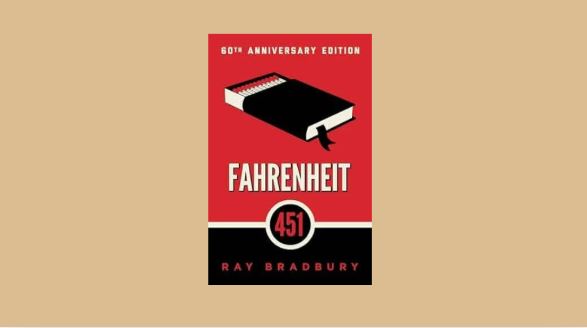Fahrenheit 451 by Ray Bradbury is one of the most famous dystopian novels ever written, yet it has frequently faced bans and challenges since its publication in 1953. Ironically, a book that fiercely critiques censorship and the suppression of knowledge has itself been censored. The novel has been banned and restricted in schools and libraries for various reasons, primarily due to its controversial themes, depiction of book burning, and its frank language. Some school districts objected to the novel’s content, citing instances of profanity and what they perceived as anti-government and anti-religious messages. Others challenged the book for its bleak portrayal of society and its criticism of the suppression of individual thought. In a particularly paradoxical twist, certain editions of Fahrenheit 451 were released with censored language to make them more acceptable for school use, diluting the very message the novel aimed to convey.
The author of Fahrenheit 451, Ray Bradbury, was a celebrated American writer best known for his works in science fiction and fantasy. Born in 1920, Bradbury grew up during the Great Depression and came of age in a time when the world was rapidly changing due to war, technology, and political upheaval. He believed deeply in the power of books and the importance of preserving human thought and creativity. Bradbury wrote Fahrenheit 451 as a response to growing concerns about censorship, the rise of mass media, and the threat of intellectual laziness. Although the novel is often interpreted as a reaction to McCarthyism and the Red Scare in the United States, Bradbury maintained that it was more broadly a warning against any form of societal control that discouraged critical thinking and freedom of expression.
The story of Fahrenheit 451 is set in a dystopian future where books are outlawed, and “firemen” are tasked with burning them. The title refers to the temperature at which paper is said to combust. The protagonist, Guy Montag, is a fireman who begins to question the role he plays in a society that suppresses knowledge and thrives on shallow entertainment. As he encounters individuals who dare to remember and preserve literature, Montag becomes disillusioned with his world and seeks a deeper truth that books represent. The novel explores themes such as censorship, conformity, the dangers of state control, and the loss of intellectual freedom. It is not only a critique of government-imposed censorship but also a reflection on the ways people willingly give up their freedoms in exchange for comfort and convenience. Bradbury’s vision was alarmingly prophetic, as it anticipates a society obsessed with screens, instant gratification, and an aversion to complexity or uncomfortable truths.
Despite the challenges it has faced, Fahrenheit 451 has endured as a powerful defense of free thought and the enduring value of literature. Its legacy continues to influence readers, educators, and thinkers around the world. That a book warning against censorship would be censored itself is a reminder of the novel’s enduring relevance and the necessity of protecting the freedom to read, think, and question.

